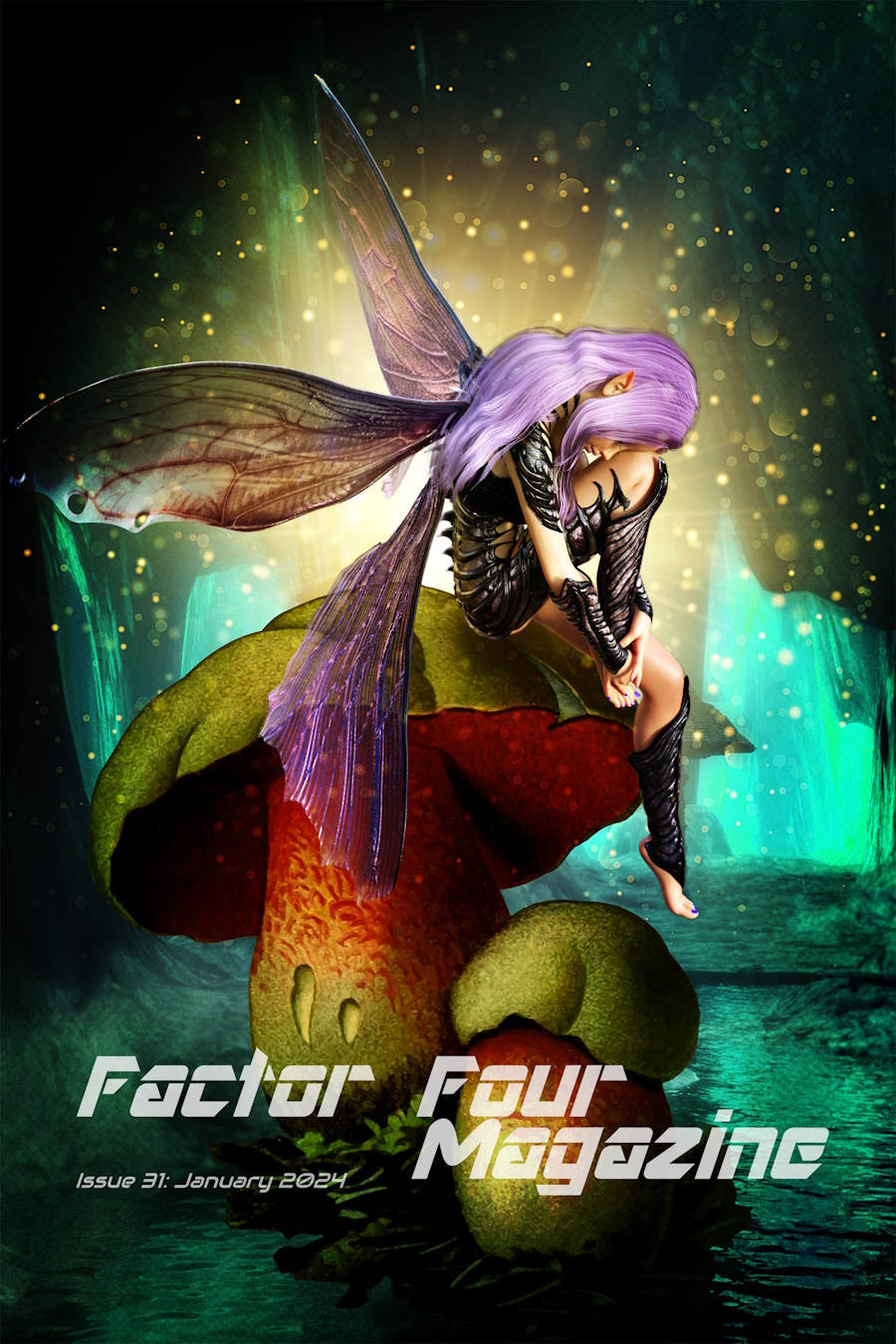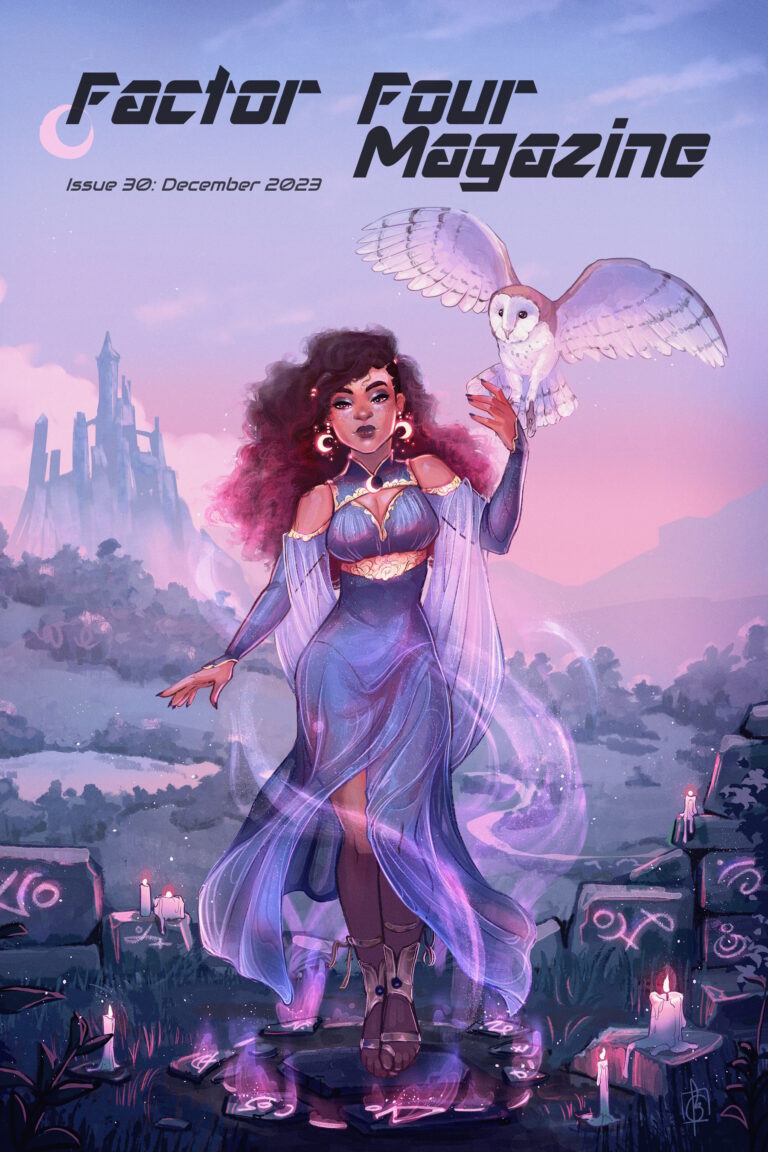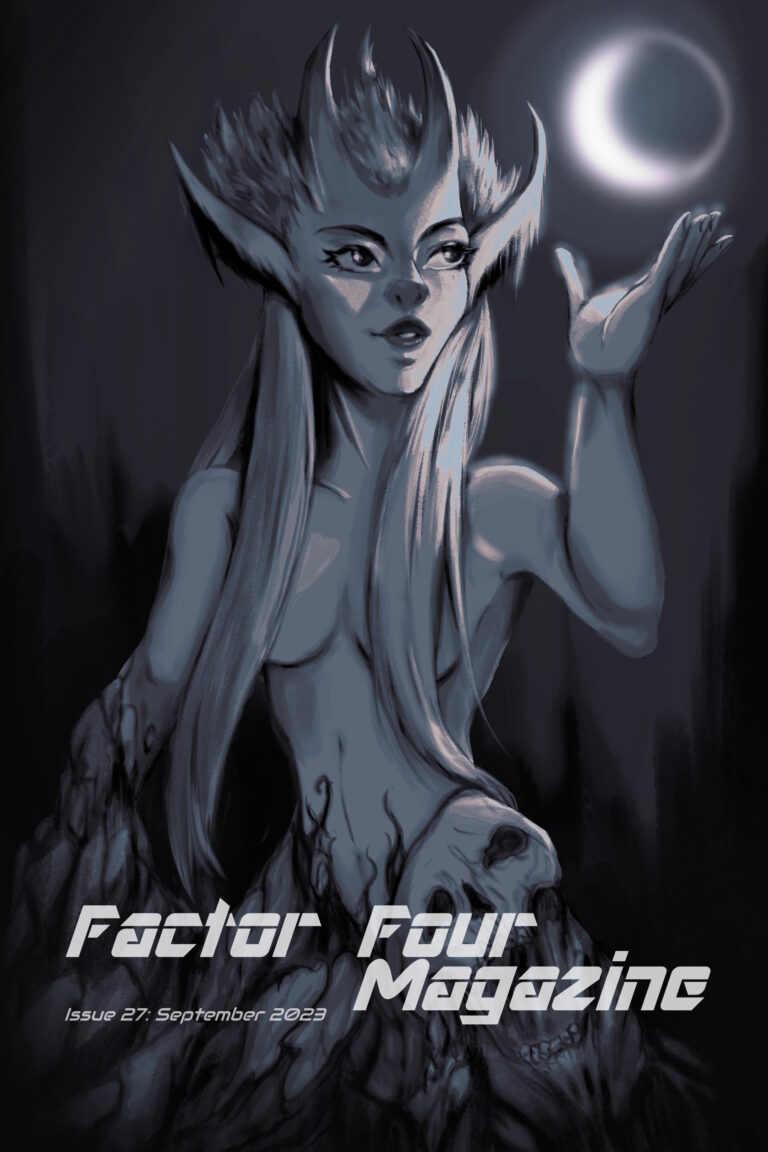The Butterfly, the Flower, and the Pollen by Arvee Fantilagan

Dalisay squeezed through the cluster of banyan trees the dwendehad told her to keep an eye out for. Then she grimaced.
Past the curtains of their impenetrable vines, stood the severed waist of a woman.
The manananggal must still be on the prowl.
Dalisay’s mother used to terrorize her nights with tales about them. About how this woman could have been walking among neighbors just this morning, gossiping, laughing. How she probably passed herself off as a friend of a local. Or a tourist from Manila. Or an old resident visiting relatives.
And how around midnight, bony wings sprouted from her back and ripped her torso into the air, carrying her toward the scent of expectant mothers she had just befriended earlier.
And that right now, she’s probably fluttering outside their window as they sleep, hungry and drooling, slithering her immeasurably long tongue into their house, into their womb, and sucking out their unborn fetus.
Of all the horrific creatures in the forests of the Philippines, the manananggal sowed the worst nightmares.
Dalisay was not afraid, though. Not tonight.
Even as she tiptoed toward the squelching waist of the bisected woman, all she could think about was her mother scolding her, as if she were still around. Dalisay wouldn’t be traversing so far and so late into these woods after all, had she righted her father’s wrongs much sooner.
“And why didn’t you bring more salt?!” her mother would have piled on.
It’s something Filipinos have grown accustomed to asking anyone they meet in these forests. A compassionate follow-up to a “kamusta!” or a “good morning!”
“Do you have enough salt?”
Most people bring at least a handful; thrown timely and firmly, they could blind the horse-headed tikbalang that often preyed on unarmed goatherds or lone foragers.
Rubbing moist salt on the tallest bamboos in a grove, meanwhile, is a sign of respect for the kapre residing there, hairy behemoths who would otherwise chase off and rip trespassers apart with their bare hands.
The diminutive dwende absolutely relish them. They would come out giggling from under their anthills and, in exchange for a pouch of salt, offer visitors their herbs, hearsays, or help—as they did when they buried Dalisay’s father for her.
And if sprinkled all over the exposed guts of a manananggal’s waist, the salt would tear through their innards and send their soaring half plummeting in pain.
Sadly—Dalisay’s mother always cautioned—no amount of salt can fend off a man in lust, pacify a woman in rage, or soothe a heart in anguish.
It can’t rouse anyone from slumber, either.
Instead, what woke Dalisay up was the distinctive thunder of wings from a distance. She didn’t even realize she had fallen asleep, the severed legs still upright and squirming next to her.
She hurried to get back up.
It was too late; the thunder soon gave way to a primal screech piercing the trees, and almost at once, claws piercing right through her.
She was slammed into the ground by the rest of the manananggal.
The prowl must have been fruitless.
Hungry hungry fangs snarled just inches from Dalisay’s face, only held back by her desperate hands already molded by ordeals like this.
But as their struggle wore on, the claws dug deeper into her, and little by little, her arms grew weary, and her memories even harsher.
She now wished she had brought more salt.
As her fangs reached Dalisay’s throat, however, the manananggal suddenly halted. Her nose twitched. She looked down the rest of her prey’s body, face awash with confusion.
She locked eyes with her.
“You’re pregnant?”
Dalisay, exhausted and bloodied, could only nod.
With a mighty flap of her wings, the manananggal pulled herself back into the air. She stayed there aloft, the expectant mother below her crawling feebly toward a nearby tree—a grim butterfly caught by its flower by surprise.
The manananggal eyed the slight mound in Dalisay’s belly, her hunger now overpowered by her curiosity.
“You don’t want it?” she asked.
Dalisay shook her head. She tried her best to steel her voice, but her words still trembled out: “It’s not mine.”
She looked up at the manananggal, long the cause of unforgivable pain among families in this land. And yet, under the soft moonlight, ornamented by her vile wings and dangling innards, the wicked butterfly reeked of absolute beauty.
Dalisay hoped the manananggal never had to suffer from that, too.
Like she did.
“Who did this to you?” her host asked.
Dalisay unclasped her skirt, and from behind her, fell out a bundle of cloth that unraveled on the grass. Inside was a machete, still soaked in her father’s blood. She wrapped it again in the cloth, much tighter this time, and glanced back up.
“Someone who’ll never do it to anyone else again,” she was certain.
Dalisay leaned back against the tree and tried to make herself as comfortable as she could.
Then she spread her legs open.
The manananggal gazed down at her, the rhythmic beating of her wings the only sound in this corner of the world. She gave Dalisay a slight nod.
“Good.”
Then her mouth grew wider. It stretched open like a gaping wound across her pretty face, skinning her teeth and jaw, peeling a path for the serpentine tongue that slowly came crawling out.
Dalisay closed her eyes and braced herself. She bit her lips, she gripped the grass, she agonized.
Soon, she was tasting her tears.
Yet, Dalisay couldn’t help but smile through her anguish. Her mother was wrong, she thought.
The salt soothed her.






